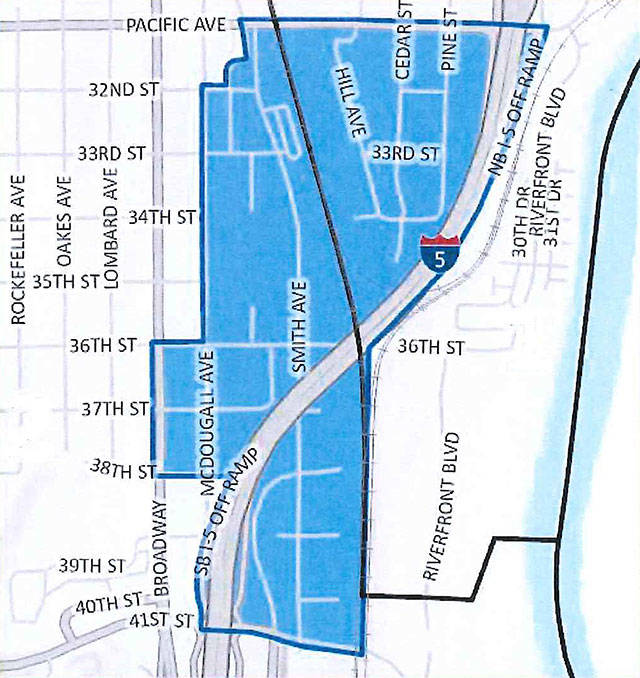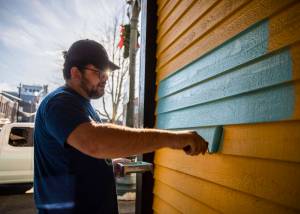City’s no-sit, no-lie ban could be unconstitutional, some say
Published 1:30 am Thursday, March 18, 2021



EVERETT — A national legal advocacy organization on Wednesday urged the City Council to reject a measure, tied to a new shelter project, to outlaw sitting and lying on some city sidewalks, saying the ordinance would violate the constitutional rights of people who are homeless.
The National Homelessness Law Center said the “no-sit, no-lie” rule would go against the Eighth Amendment’s prohibition of “cruel and unusual punishment.”
“The City of Everett should not continue to propose problematic encampment ordinances so that they may further criminalize homelessness,” wrote Eric Tars, legal director of the center. The D.C.-based nonprofit advocates for solutions to end homelessness while preserving civil liberties.
“Instead, the best way to address the problem is by removing the need for people to shelter themselves in public in the first place, by providing adequate housing and services,” Tars said in a letter emailed to the City Council just before noon Wednesday.
The ordinance, which the City Council passed at its meeting Wednesday night, will outlaw sitting or lying on public rights-of-way within a roughly 10-block area east of Broadway, from 41st Street to Pacific Avenue.
Violators will face misdemeanor charges that could result in up to 90 days in jail, a maximum fine of $500, or both.
Within the proposed no-sit, no-lie zone is the Smith Avenue shelter, run by the Everett Gospel Mission, one of the primary organizations that serves people who are homeless in Everett.
The law had to pass for the city to advance an effort to open a village of individual shelters, known as “pallet shelters,” on vacant land behind the mission’s existing shelter. The units are expected to house up to 3o people at a time, providing a stable and safe environment for them as they seek permanent housing, with the help of service providers.
In a bid to protect businesses and residents along the Smith Avenue corridor that have long been affected by the homelessness crisis, the council voted in February to make the no-sit, no-lie law a condition of the project, first proposed last fall.
The ordinance will not take effect until the pallet housing is available.
A high-profile federal court decision prohibits governments from enforcing laws that bar homeless people from sleeping outside on public property — unless those individuals have other options, such as a shelter or sanctioned encampment. The U.S. Ninth Circuit Court of Appeals cited the Eighth Amendment in its decision in Martin v. City of Boise.
An Everett Municipal Court judge also cited the Eighth Amendment in 2016 when he struck down a citywide ban on camping on public property.
But city staff have said that the ordinance is “defensible” because it does not outlaw such conduct across the entire city.
“It is not possible to predict with certainty whether a court would uphold an ordinance, but this ordinance was designed specifically with existing case law in mind to pass constitutional muster,” City Attorney David Hall said in a written statement before the council meeting.
“In particular, the court in Boise v. Martin stated that a factor in determining whether such an ordinance is constitutional is the geographic scope of the ordinance,” Hall said. “Unlike the ordinance in the Boise case, which applied city-wide, this proposed ordinance would apply only to a very limited area.”
A footnote in the federal decision that states prohibitions on sitting and lying “might well be constitutionally permissible” if only enforced “at particular times or in particular locations” — even when someone has no other shelter alternatives.
The new law will also prohibit people from providing food, goods, supplies or services in the area without a permit from the city.
Lawyers at Columbia Legal Services and the American Civil Liberties Union of Washington, civil rights watchdog organizations, also questioned the ordinance’s legality. They echoed what advocates for the homeless have long said about such punitive measures in other cities: Enforcing them costs taxpayers and only exacerbates the day-to-day struggles a homeless person experiences.
“This brings us a number of concerns — both from a legal lens, but also from a policy lens,” said Breanne Schuster, a staff attorney for the ACLU of Washington. “The goal of the ordinance appears fairly targeted to dispersing and displacing folks who are visibly experiencing homelessness,” she said, instead of solving a public safety problem, such as sidewalk obstructions.
Many other cities, including some in Washington, have laws that prevent homeless people from sitting or lying in public rights of way.
Seattle has outlawed sitting or lying on sidewalks between 7 a.m. and 9 p.m. downtown and in neighborhood commercial zones.
Monroe passed a no-sit, no-lie law in 2018. Marysville has had one on the books for decades.
“What’s really incredible about that trend is we know that it doesn’t work,” Schuster said. “It doesn’t reduce homelessness at the local, regional or state level. It doesn’t make housing more affordable.”
Everett considered a similar ordinance in 2015, but it was pulled from the City Council’s agenda amid backlash.
Supporters of the new rule contend that it will improve safety along Smith Avenue. Business owners say the presence of people who are homeless has given rise to crime.
Unsheltered folks clustered along the corridor are routinely subject to stigma and harassment by passersby, too, according to Everett Gospel Mission CEO Sylvia Anderson. The measure could resolve what has become a dangerous situation for everyone, she has said.
“The intent is not to criminalize homelessness, but to ensure that the city’s pallet shelter pilot project adjacent to the Everett Gospel Mission succeeds,” said Hall, the city attorney. “The hope is that some of the individuals experiencing homelessness in the Smith Avenue area will move into the new shelter units. That pilot project is unlikely to be deemed a success if it adds to, rather than reduces, the street-level social issues already overwhelming businesses and residents in that area.”
Oskar Rey, a legal consultant for the Seattle-based Municipal Research and Services Center, said Everett’s ordinance would probably pass constitutional muster if legally challenged. He commended the city for planning new shelter beds in conjunction with the enforcement measure.
“I think cities have the ability to say certain types of areas are off-limits so long as they’re not spreading that as a citywide prohibition on camping or sleeping,” said Rey, who was previously an assistant city attorney in Kirkland. “Enforcement can’t be your only strategy and it can’t be your primary strategy. It needs to be part of a more comprehensive strategy. That also includes social services. That also includes outreach.”
How many homeless individuals regularly stay along the Smith Avenue corridor remains a question.
Local advocates for unsheltered folks have pointed out that there are usually more than 30.
Everett’s unsheltered homeless population has swelled amid the COVID-19 pandemic because the Everett Gospel Mission and other sheltering organizations have had to slash bed counts to comply with social distancing requirements.
City and county officials dispersed homeless encampments in a series of sweeps last summer, leaving many unsheltered folks with nowhere to go. Days after an encampment was broken up downtown, another appeared in a vacant lot on Rucker Avenue.
To legally enforce the no-sit, no-lie law, the city would likely have to ensure that there is enough shelter available for anyone within the area who needs it, said Janet Chung of Columbia Legal Services.
“So as long as there is more need than is being served, then I think that’s a problem,” said Chung, who is advocacy director for the statewide civil legal aid organization. “I can’t say if it’s legal or not, but I will say that it will certainly invite close scrutiny.”
On Tuesday, the state Supreme Court heard oral arguments in a case that could have implications on other penalties sometimes imposed on homeless people who live in their vehicles.
Columbia Legal Services is co-counsel for the plaintiff, Steven Long, who sued the city of Seattle after the truck he was living in was impounded for a parking violation, leaving him without shelter and other necessities. He could only get it back after paying more than $500 in fees — an “excessive fine” that’s prohibited by the Eighth Amendment, his attorneys have argued.
“A lot of people, I think, are engaged and worried about how cities are handling these issues and really hoping that cities are putting their resources in services rather than laws that can’t be enforced without potential legal challenges,” Chung said. “That costs cities, too, of course, to defend those laws.”
Such ordinances can also be expensive due to the cost of enforcement and jailing offenders.
Everett pays Snohomish County to incarcerate municipal law offenders at a rate of $143 per day per inmate, according to city Councilwoman Liz Vogeli, who has spoken out against the proposed ordinance.
“Numerous studies have shown that communities actually save money by providing housing and services to those in need, rather (than) saddling them with fines, fees and arrest records and cycling them through expensive hospital and jail systems,” wrote Tars, of the National Homelessness Law Center.
He suggested that, instead of passing the ordinance, the city of Everett move unsheltered people into hotel rooms using pandemic relief funding made available by the Federal Emergency Management Agency.
“The lack of capacity to house or adequately shelter the people experiencing homelessness means these people are merely dispersed to different public spaces,” Tars wrote, “and will inevitably find themselves subject to the proposed ordinance again.”
Violators of the ordinance will get a warning from law enforcement before facing charges.
Rachel Riley: 425-339-3465; rriley@heraldnet.com. Twitter: @rachel_m_riley.







